Here at Agrumi we specialise in Bespoke Topiary, however, we also supply many classic architectural topiary shapes.
We can offer balls, cones, pyramids, spirals and standards, all at very competitive prices in a wide variety of plant species.
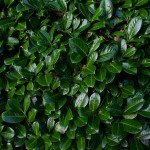 This erect, evergreen shrub has aromatic ovate leathery leaves useful in cooking. Its small, greenish-yellow leaves grow in dense clusters making it perfect for growing as a standard tree. Its oval, glossy fruits become black when ripe.
This erect, evergreen shrub has aromatic ovate leathery leaves useful in cooking. Its small, greenish-yellow leaves grow in dense clusters making it perfect for growing as a standard tree. Its oval, glossy fruits become black when ripe.
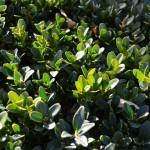 Is a slow-growing evergreen shrub, compact in habit with small, glossy oval or oblong leaves and small yellowish flowers. It is not suitable for bespoke topiary, but perfect for classic topiary shapes like balls and spirals.
Is a slow-growing evergreen shrub, compact in habit with small, glossy oval or oblong leaves and small yellowish flowers. It is not suitable for bespoke topiary, but perfect for classic topiary shapes like balls and spirals.
 The prolific growing properties of the evergreen Leyland cypress can make it a source of irritation when used a hedge or screen, but it also makes for beautiful classic standard topiary when kept under control. The genus provides species in a palette from dark green to pale yellow.
The prolific growing properties of the evergreen Leyland cypress can make it a source of irritation when used a hedge or screen, but it also makes for beautiful classic standard topiary when kept under control. The genus provides species in a palette from dark green to pale yellow.
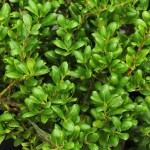 Holly is a tough plant, happy in free-draining soil in most positions in tubs or in open ground. With a range of dark green or variegated species and the promise of beautiful red berries, it makes another perfect choice for standard topiary designs.
Holly is a tough plant, happy in free-draining soil in most positions in tubs or in open ground. With a range of dark green or variegated species and the promise of beautiful red berries, it makes another perfect choice for standard topiary designs.
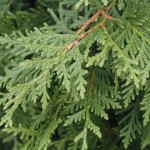 These coniferous evergreens have a stringy texture and reddish-brown bark. They are widely grown as ornamentals and hedges, but also make good standard trees.
These coniferous evergreens have a stringy texture and reddish-brown bark. They are widely grown as ornamentals and hedges, but also make good standard trees.
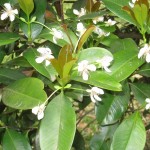 This bushy, medium-sized shrub has small aromatic, ovate leaves and profuse star-like white flowers, 2cm in width followed by purplish-black berries. In contemporary plant-lore it symbolises love and is routinely used in Royal wedding bouquets.
This bushy, medium-sized shrub has small aromatic, ovate leaves and profuse star-like white flowers, 2cm in width followed by purplish-black berries. In contemporary plant-lore it symbolises love and is routinely used in Royal wedding bouquets.
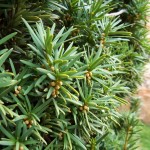
Slow-growing, but long-lived these coniferous trees can grow up to 40 metres high. Used in standard topiary however, and kept clipped, they make stunning, dense show plants.